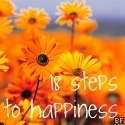Right, because those are just words. And if it were that simple everyone would have already done it. Furthermore, as the man expounded on his comment, it was clearly evident that while he understood the concept and the idea, he wasn't actually live it just yet.
That's how transformation works for most of us--we learn to say the words long before we learn what it means to really live them. And even then competency comes in pieces. We get out feet under us one area then realize we don't have it all figured out in another.
So, let's get to the bottom of this "you've got to love yourself" thing. What does it even mean?
And there's the crux of the problem: it means different things to different people because that pesky little four-letter word has so many different assumptions, projections and connotations attached to it. "I love my new dress" expresses a far different emotion than "I love my new husband"--at least one would hope.
Since we need about twenty different words for "love" to deal with the world outside ourselves, how can we expect to apply that nebulous term internally to create some idealistic personal bliss?
Personally, even thought I understand what's behind the "love yourself" intent, the phrase just does not compute for me. And how could it, given that love in my dictionary was something I could only get from someone else, and that I could only give by giving up my sense of self ?
That little twisted train of thought is even further muddled by this one: "If you don't love yourself no one else will." Well, that didn't compute either and, in fact, it totally fried my circuits for obvious reasons.
If you've read The Hardline Self Help Handbook, you know where I went with this topic to make it work for me and get me out of that horrible cycle of confusion and turmoil--I replaced the word love with respect. And once I did that, things began to clear and I realized that hopping down the bunny trail that I thought was "loving," wasn't--not to me or my partner.
So, for me, the question that kept me pushing forward through the transition to a new definition of caring for myself was this: Would a person with high self-esteem and self-respect do what I'm doing? Think what I’m thinking? Tolerating what I’m tolerating? And then I asked why or why not. Answering the "why" helped me figure out the beliefs that were driving me to do what was I was doing--and whether they were really giving me the results I thought they were. Once I knew that, I could decide if wanted to make different choices to get the outcomes I really wanted.
Now, for those of you who are enamored with the "all you have to do is love yourself" issue, here are a few questions to ponder:
- How do you know you don't love yourself?
- How will you know when you do? What will change? What will your world look like then?
- How will you feel then?
Let me know what you think!




































0 comments:
Post a Comment